
11 minute read
Welcome to Another Era
ished elementary education in Bida and attended the Government Science School Kuru, Jos. He attended the prestigious Ahmadu Bello University, (Minna campus) and obtained the National Certificate in Education (NCE) with a major in Biology in 1988. He was at the same institution for the Bachelor of Science Degree in Biology between 1991- 1995. He enrolled at the Federal he obtained a PhD in Ecology and Environmental studies from the Nigeria Defence Academy. Dr. Mani commenced his career as a civil servant with the Niger State Government between 1990 and 2000, then he joined the Nigerian Turkish International College, Abuja as Vice Principal. In 2008, he was appointed at the Nile University of Nigeria, Abuja as Principal Assistant Registrar and Lecturer 1. In 2011, he joined Baze University Abuja as a Deputy Registrar and was later appointed the Director Academic Planning and Senior Lecturer in the Department of Biological Sciences. He held these positions until his recent appointment as the Registrar. During his tenure as Director, Academic Planning, he was instrumental to the approval, establishment and take off of four (4) Faculties in the University including the most recent; the Medical programme.
Mani Ibrahim Ahmad, PhD, FNIM of Senate and Secretary to the Governing CounRegistrar, Baze University, Abuja cil and the Board of Trustees. Dr. Mani is well 1st February 2020 grounded in University Administration, Academic The only constant phenomenon in life is change. On the 1st of February 2020, history was made at Baze University Abuja, with the appointment of a new Registrar. Mani Ibrahim Ahmad was appointed as the third in the line of successive Registrars of the University. David Ogbonna, Esq. was the pioneer Registrar and was succeeded by Maj. Gen Inuwa Idris (Rtd) who recently finished his tenure. Planning, Environmental Impact Assessment & Sustainability, Aquaculture and Fisheries, ICT, Research, Public Speaking and national politics. He is a fellow of the Nigerian Institute of Management and an Ambassador of Peace of the Inter-religious and International Federation for World Peace. He is a member of the Red Cross Society of Nigeria and the Ecological Society of Nigeria, among others. Mani Ibrahim Ahmad was born on the 20th of June, 1968 in Bida, Niger State, Nigeria. He finBaze Focus Magazine wishes Dr. Mani Ibrahim Ahmad a very successful tenure. University of Technology, Minna in 1998 and ob- Vice– Chancellor Prof. Tahir Mamman Outgoing Registrar Maj. Gen. Inuwa tained a Masters Degree in Fisheries. In 2014, congratulating Dr. Mani (new Registrar) Idris (rtd) congratulating Dr. Mani.

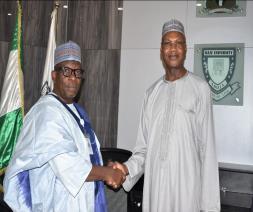
As a Registrar to the University he is a member
VC Prof. Tahir Mamman in company of DVC (Admn & Acad) congratulating Dr. Mani Ibrahim Ahamd (new Registrar).
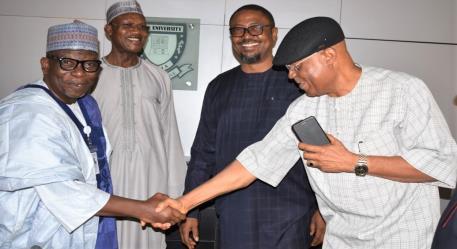
In celebration of meritorious service to Baze University, we present a new feature to exemplify pioneer staff. Baze Focus Magazine found the first officer to be employed at Baze University; enjoy the Interview with him.
Sir, briefly introduce yourself to our esteemed Readers.
My name is David Ogbonna. I attended Primary School in Enugu and Secondary School at the Federal Government College, Minna. I obtained my First Degree in Sociology from the University of Calabar and undertook National Youth Service in Katsina. Thereafter, I proceeded to the United Kingdom (UK) where I obtained an LLB and LLM from Cardiff University. I qualified as a Solicitor in UK and worked for 20 years before returning to Nigeria. I started my career as a humble Housing Officer for a Housing Association. There, I gained experience in Property Financing and Property Development as well as Housing Management. It is a bit odd for one to begin to speak about one’s achievements, but back then, I did contribute my quota, as I rose from a humble Legal Officer for the Commission on Racial Equality to become the Corporate Lawyer for the Commission in UK. Subsequently, I David Ogbonna, Esq. was appointed by Her Majesty’s Government as the Lawyer that set up the Deputy Vice Chancellor (Administration) Equality and Human Rights Commission in the UK. This appointment really set the tone for the height of my achievements; being able to offer advice to Ministers and Senior Civil Servants and seeing that one’s advice positively influenced or impacted the direction of public policy gives you a sense of achievement and self actualization. As part of fulfilling my social responsibility, I represented a lot of clients on a pro bono basis at Employment, Medical and Immigration courts. I also worked as a Consultant and Company Secretary to various NHS Trusts in the UK.
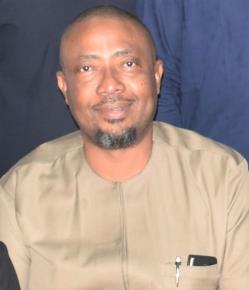
How did you get appointed into Baze University, Abuja?
I was head-hunted and interviewed by Prof. Michael Hodd, the pioneer Vice Chancellor. I remember meeting him at a Hotel in London over Coffee. I spent two hours being interviewed by him, he asked probing questions about my abilities and capabilities. After that, I was offered a job as the pioneer Registrar. I flew to Abuja to see the new University and I accepted the offer. I have also known Senator Datti Baba-Ahmed (the Proprietor and Pro-chancellor of Baze University) for a great number of years, back in the early 90s when he was in the UK studying for an MBA at Cardiff University.
As a Queen’s Counsel in UK and given your pedigree, what convinced you to join a new University that had no past performance record?
Well, I am not a Queen’s Counsel. A Queen’s Counsel is the equivalent of a Senior Advocate of Nigeria, I did not achieve that but I was and still am a Solicitor of the Supreme Court, England and Wales. Having achieved as much as I could in UK and having seen the vision of the Pro-Chancellor for the new university; I came to Nigeria without hesitation, to contribute my own quota to the development of my father land.
What was the initial vision for Baze University? Is it still on course?
Well, the initial vision is still on course. Quality education; imparting purposeful knowledge; concept of ‘going through a University’ and not a University going through you; all these are still on course and the testament to these is the positive feedback from our graduates, some of whom have gone Overseas to undertake Postgraduate studies and have come back with Distinctions.
Give us a sense of history on the first 24 months of the University?
We started as a young University in 2011 with 17 students and we have grown from there. In terms of physical infrastructure, we had the Ahmadu Abubakar building which formed the nucleus of academic and administrative activities at that time. Then there was the Baba-Ahmed Square. So, we gradually started to expand, we didn’t have a hostel on campus, the students stayed in blocks of flat in Kado and we quickly came to the decision that it wasn’t convenient for them to remain there. The school was growing rapidly, so we built what is now the Nuhu Jume quarters and we housed students there. One section each for the boys and girls but very quickly the hostel filled up. We had to contract a construction firm to do sixty-four, one bedroom flats on a build, operate and transfer basis. In the interim we had an arrangement with a hotel in Wuye, to house our students. the hotel literally closed up as we took the whole rooms for one semester while the one bedroom flats (Shagari Estate) were completed. Subsequently and very quickly we built what is now the Law Faculty (Ojo Building), followed by the Michael Hodd building which is the Faculty of Computing and Applied Sciences. As the student numbers continued to grow, we built the Gowon Estate (40, 2 bedroom flats) and moved the female students there while the boys remained at Shagari Estate. Subsequently, we built the two hostels that the students currently occupy. So we grew from a very humble beginning to now having 6 Faculty buildings, including (Justice M A Belgore Building (Medical and Health Sciences), Moddibo Building (Faculty of Environmental Sciences) and the Rose Okwechime building (Faculty of Engineering). In addition, we now have the Multi Purpose Hall that was completed in 2015/16. So the infrastructure had grown to now over 49,000sq meters of both academic and allied structures. Currently we have started the construction of the Teaching Hospital, hopefully to be completed before the middle of 2021.
What were notable milestones achieved in the University’s first 5 years?
One notable milestone was the maiden Matriculation Ceremony for the first set of students. Other milestones are: the structured arrangement of all the university buildings and the ‘wow’ effect when visitors drive into the campus and the undisturbed landscape dotted with manicured hedges. The ambience reminds one of prestigious citadels of learning; Oxford or Cambridge University with the solemnness that is conducive for learning. The first Convocation was notable, it was nostalgia watching the first set of young ladies and men, file past to collect their Degrees. NUC’s Approval to start professional courses like Engineering and Architecture, comes to mind. Another major milestone was the change in leadership; for a new University, change sometimes is difficult. The transition from the pioneer Vice Chancellor (a Briton) to a Nigerian could have gone pear shaped but it did not. Prof. Tahir Mamman, SAN, took the mantle and continued most effectively making the transition seamless. That, indeed, was a major milestone among many others.
This University has come of age, are there any specific contributions to the Nigerian Higher Education sector?
Hmm. Contributions to higher education in Nigeria? Well, many things come to mind but the first significant one is our exam governance structure, it is like that of no other University in the country. The exam process ensures a high level of integrity that removes untoward behaviour in the form of harassment or monetary inducement. No examiner knows whose paper they are marking because of computer bar code identification and the Conference Marking of scripts at designated venues. I remember when Prof. Rukaiyyatu Ahmed Rufa’i, the then Honourable Minister of Education visited Baze University, she was amazed when we introduced her to our exam processes and she did make a public statement then that other Universities should learn from Baze. Similarly, the way we organize and structure our academic calendar is such that we maximize the use of our facilities, that is another thing that many Universities seek to learn from Baze University. Lastly, the automation of all our processes, our information technology system is second to none and I am proud to say was developed in-house!
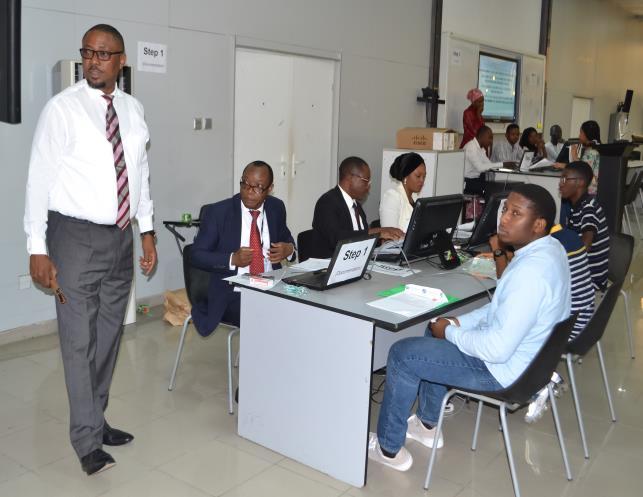
You’ve been here for about a decade, what were your best and worst moments?
My best moment was when I witnessed the graduation of students. Graduation ceremonies are always pride moments for anyone involved in the process of education. The worst moment well, there was a security breach when hoodlums entered the University and tried to harass students but that was quickly averted because our security personnel were equal to the task. This, perhaps, is the primary reason the proprietor of the University, Sen. Datti Baba-Ahmed takes security issues as paramount. I remember getting a call from him at about 2am on the day of that incident and I rushed to the campus only to find that he was already there. We learned some lessons from that incident, and we have in place a very robust security architecture in terms of CCTV coverage and boots on the ground. The proprietor makes it a point for Management to ensure that the whole campus is under complete surveillance so that any breach is immediately identified, and the possible danger is quickly averted.
Has it been worthwhile, leaving a stable job in UK for Nigeria?
Oh, yes! It has been worthwhile leaving a stable job in UK for Baze University. I am glad to be part of the history of the humble beginnings of this institution, which will definitely out last all of us.
Where do you see Baze University in the next 20 years?
In the next twenty years, I see Baze University producing: many PhDs with unique Research that contribute to academic knowledge; Medical Doctors of distinction; our first Senior Advocate of Nigeria and many novel inventions to rise higher in the ladder of World University Ranking.
What advice would you give to younger staff of the University?
My advice to encourage them to work hard, to be dedicated in their job schedule and understand that Baze University is a unique brand that does not compromise standards. The system expects the best from all staff and I urge them to give their best, work hard and upscale the current legacy at Baze University.
What are your hobbies?
I love Football and Badminton and used to play them when I was younger, but now I just watch matches on TV. I am a fan of Liverpool Football Club. I like watching movies and listening to music especially Jazz.
Are you currently engaged in any community service?
Humm, if your definition of community service is formal, then I would say no. My work schedule at Baze University does not afford me much personal time to oversee a formal NGO, but as a passion, I contribute to the society in many other ways. I assist individuals and families that are less fortunate with upkeep and support; brilliant but indigent students with scholarships to acquire formal education.
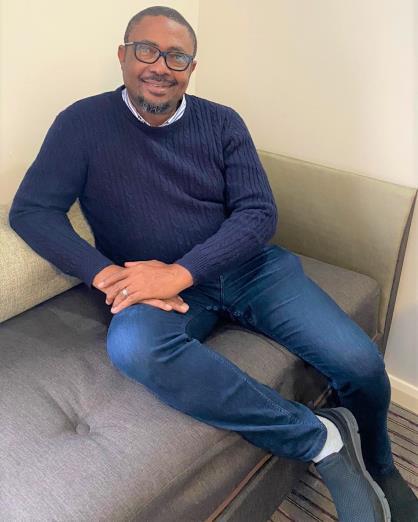
Would you like to share any aspect of your Family Life with us?
I prefer to keep my family life private. I am married and I have three Boys who mean the world to me. I miss them a *David Ogbonna Esq. (ID No: E001), employed as pioneer staff and the Registrar of Baze Unilot but technology helps me to communicate with them as versity Abuja. He is now the Deputy Vice Chancellor (Administration) . frequently as possible. I travel to see them as often as my schedule permits.










